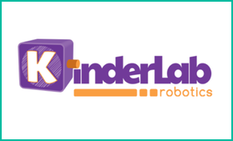
Each lesson includes facilitation suggestions, materials lists, center setup, and academic standards alignment. The new guidebook supplements Creating with KIBO, KinderLab’s core curriculum booklet that covers programming, robotics, and the engineering design process with KIBO
KIBO is a robot kit that allows children aged 4–7 to build, program, decorate, and bring their own robot to life without requiring any screen time in front of a tablet or computer. It serves as an open platform on which students can envision and create their own robot. With art and engineering, students transform KIBO into imagined animals, vehicles, storybook characters, and more. Students plan a coding sequence using the programmable wooden building blocks, then scan their sequence with KIBO, press its button—and the robot comes alive.
The guidebook helps teachers maximize the use of one or two KIBO kits within a larger class, a makerspace, or a library. Students can rotate through the stations, whether independently or in small groups. The lesson plans can stand alone, or they can reinforce whole-class curriculum through hands-on inquiry into specific aspects of the material.
Activity lesson plans provided in the guidebook include:
- KIBO Bowling: Students use math skills such as measurement and estimation to program KIBO to reach the pins.
- KIBO Dance Party: Students learning about world culture combine music, art, and coding to create a KIBO dancer.
- KIBO Shape Search: Exploring geometry, students program KIBO to draw shapes they find in the classroom.
Educators who have tried the activities have found them effective and engaging. Todd Burleson, maker/teacher/librarian at the Hubbard Woods Elementary School in Winnetka, Illinois, as well as School Library Journal’s 2016 School Librarian of the Year, describes KIBO Bowling: “KIBO Bowling is a fun way to develop mathematical and logical thinking skills. Students built a program that moved KIBO down their ‘lane.’ They used tally marks to record the number of pins knocked down on their first attempt. Then, the students tweaked their program to try to get the remaining pins. Students can explore starting KIBO at different spots along their starting line and adding turns, spins and even flashing lights for fun!”
Jason Innes, the manager of training and curriculum development at KinderLab Robotics, Inc., said, “We are excited to make this new guidebook available to teachers looking to establish their own robotics activity center. KIBO is a great fit for an activity centers-based classroom or makerspace. With its combination of coding, engineering, and art, KIBO is a STEM center, a blocks-building corner, and an imagination play area all in one! KIBO is a wonderful platform for student-directed, hands-on inquiry, and the activities in this new guidebook encourage independent, playful STEAM learning.”
The KIBO Activity Center Guidebook is available for $30 and can be purchased on the KinderLab Webstore. Starting today, customers who purchase two or more KIBO robot kits will receive the Activity Center Guidebook for free. KinderLab customers who already have KIBO can purchase the guidebooks at a 20% discount, with a limit of one per customer. Both offers expire on 9/30/18.
About KinderLab Robotics, Inc.
KinderLab Robotics is the creator of KIBO, a robot kit based on 15 years of child development research, that enables young children to build, program, decorate, and run their own robot. Developed by Dr. Marina Umaschi Bers at Tufts University specifically for teachers, KIBO is used in 54 countries and has proven efficacy in helping kids learn STEAM—and get excited about it! KinderLab offers a complete suite of teaching materials that help integrate STEAM elements into a wide range of curricula, including art, cultural studies, and reading literacy. KIBO is a GOLD Winner of the 2017 Parents’ Choice Award in the Toy Category, and a Finalist in The Tech Edvocate’s "Best Early Childhood Education App/Tool" category.
For more information, please visit KinderLabRobotics.com.












